
JULIA LEE BARCLAY-MORTON – YOGA, WATER AND REWRITING AUTISM
I interviewed writer Julia Lee Barclay-Morton about her experience of autism. Julia began as an experimental dramatist in New York, moving to the UK to
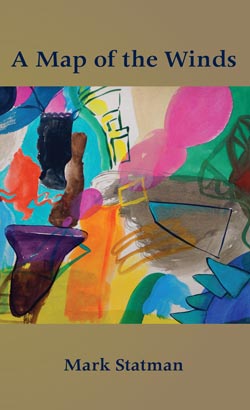
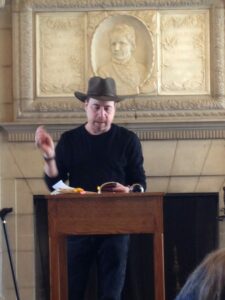
In part two of Mark Statman’s interview about Religion and Poetry he goes deeper into his own practices and beliefs as a poet.
Leslie:Joseph Brodsky said: ‘Poetry amounts to the arranging of words with the greatest specific gravity in the most effective and externally inevitable sequence’. How do you, as a writer, aim to achieve additional, symbolic or multi-layered meaning when writing? Is there a kind of deliberate ‘transcendentalism’ or artifice involved in selecting significant detail when you write? Or is the random/chaotic or the post-modern manipulation of sign/symbol a more accurate reflection of life?
Mark: As a poet, I’m not sure, at the moment of first writing, what I’m aiming for in any given poem. While I’m writing, at least in the first or second draft of any poem, I don’t think, oh this will be a good place for an image or this will be a good place for a metaphor, or here it would be interesting to bring in the universe. So, no, I don’t think there is anything deliberate. And, as for what emerges, well, it’s what emerges, because it isn’t pre-determined, as far as I can tell, I look for what it offers me to decide what it is I think is going on. Usually I’m right but just the other day, a student who came to one of my readings was writing to me about a poem I’d read and she had a take on the poem that didn’t contradict my understanding of it, but added a layer, an emphasis, I hadn’t seen. And I don’t think she was imposing herself on the poem, as in, this is what I (the student) want the poem to be about. She just emphasized something else that she thought important that was already there.
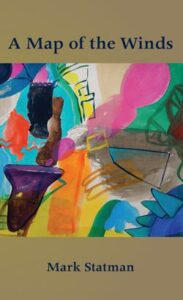
But I’m not so sure how comfortable I am with the idea that what comes out is all about randomness and chaos. Because I think what I understand here is preparation. Bill Bradley, the former US Senator and basketball great used to talk about how, as a player, he always had a sense of where he was on the court, as well as a sense of everyone else, even without looking. He could just feel it. But that sense doesn’t happen by accident. A lot of practice goes into the making of a basketball player and a lot of practice goes into the making of the poem, no? That is, I’ve been writing and reading poetry for a long time and I’m very happy to be surprised and very happy to, as Frank O’Hara suggests, go on my nerve. I don’t know what’s coming, I don’t exactly want to, but I do trust that what’s coming will be worth my while because I have the experience of it having happened before, that is, if I am open and ready for the experience and the words, the poem will come. Or at least, that I’ll be able to spot what works and what doesn’t in whatever it is that does come.
But the Brodsky quotation, the idea of arrangement, I think that is important. A sense of order (things as they are), a sense of arrangement (so much depends upon). I revise a lot because I think it’s the best way to achieve freshness and spontaneity.
Leslie: If the essence of religion and poetry is doubt, how do you create a kind of provisional certainty out of what is, in essence, a consciously-chosen journey of discovery into the dark?
Mark: I’m not sure it is a journey into the dark. I think we’re already in the dark. But we’re also already in the light. That is to say, yes, we live in a condition of doubt, but it’s not because the answers are elsewhere. The answers are all around us. We may not see them all the time, they may be invisible. Invisibility is, for me, a big idea. We know about visible matter, the visible world. What scientists call dark matter is more accurately called invisible matter. It’s not that it isn’t there, it’s that we can’t perceive it, not with technology, not with our senses. Maybe with the imagination? Using the force of the soul at work?
One idea is that the universe as we understand it started some 13 plus billion years ago. At the time, it was so sub-atomic as to be smaller than anything measureable. Now, because the universe is infinitely expanding, it is larger than anything measureable. But it’s there! That’s the certainty for me – that it is there. And not just out there, but all around, everywhere. Invisible and somehow knowable, even in a state of uncertainty about what it is one is knowing.
This idea of infinity excites me and reassures me – because it is dynamic, unpredictable, brilliant. It’s much easier for me to understand than eternity, which seems static. Eternity? This is all there is? How could that possibly be?
Leslie: Is being a poet, or poetical, something you do as an existential ‘try-on’ where you act as if it has meaning in order to make it so?
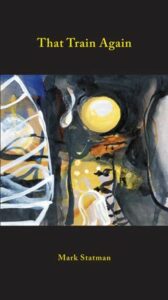
Mark: I don’t think I try-on being a poet. I am a poet. Even when I’m not writing poetry, well, how I understand the world is filtered through that. And I don’t really need to act as if there is meaning. It really is there. Sometimes grand, sometimes small, sometimes obvious, sometimes subtle. I mean, to a small child an ice cream cone has intense meaning. Much more meaning than thoughts about the soul. Because why should the soul be as meaningful to a three year old as an ice cream cone?
Leslie: Does the poem write us or do we write the poem?
Mark: It’s both. Willie Nelson talks about how the air is full of songs. He just needs to listen and write them down. In poetry, the idea is to pay attention to all the poems that are ready to be written and then figure out which ones make the most sense to write. Or at least, for me to figure out the ones that make the most sense for me to write.
Leslie: What is the role of metaphor in poetry and religion? Do you feel that there is an opposition between literalism/materialism and poetry?
Mark: Maimonides, in his Guide for the Perplexed, writes that everything is metaphor, except when it isn’t.
Leslie: Two quotes about silence: ‘A poetic form is essentially a codified pattern of silence. We have a little silence at the end of the line, a bigger one at the end of a stanza, and a huge one at the end of the poem.’ – Don Paterson ‘The poem having been translated from the silence, as Charles Simic puts it, has briefly kept the company of everything, of all natural things, and its desire to then declare a kinship with those things – to become a beautiful manmade natural object, with the integrity, symmetry and rhythm of the natural – should be no surprise.’ – Don Paterson. What do you see as the importance of silence in both poetry and religion?
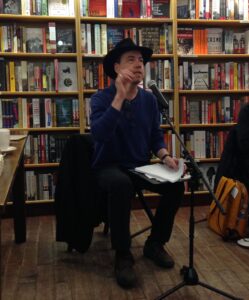
Mark: Sometimes I wonder if silence is not one of the spaces in which it’s possible to know a kind of intersection between the invisible and the visible, almost, zen-like, haiku-like, as the space that allows us to slip between realities. In That Train Again, I have a poem of seven short poems called Seven Meditations (for Silence Week) and I really meant them as poems for contemplation and reflection. Last fall 2015, the poet Don Yorty, who has been working on a project in which he films poets reading their work at home, filmed me reading. At one point during the filming, he asked me to read the series. I realized at the time that I’d never read them out loud! They weren’t meant for that, or so I’d thought. So I read them, and I really liked what they did to the room and the way, in their own spoken quality, they seemed to amplify the silence. Since then, I’ve read them at a number of readings and I’ve been happy to see how, the silence of them still resonates.
Seven Meditations (for Silence Week)
the end of despair
and the end of denial
began with the wind
blowing warmly
from the east
as soon as it could
2. subway toddler
mami, she said
the train over
elevated tracks
mami, veo el mundo
the world
she sees
the world
from the elevated train
the world
3. full moon
next to Jupiter
the deception
of distance
that planet
of so many moons
dwarfed
in this darkness
by ours
4. covenant
the words
were written
on black fire
with white
I say
to you
this love
that strong
carrying
centuries of faith
in
these short years
our lives
5. coming rain
I know what
those thunderheads mean
a sudden blue starling
in the trees
even with all the sun
even
here comes the rain
as in old songs
here comes
6. don’t tell
that path
over there
the one
deer follow
silent, crashing
sure-footed
one and another
7. lost
from view
nothing left
through yellow
what speaks
what to where
a curve of branch
a curve of road
curve of something
in flight on breeze
a curving
curving away
Leslie: Sacred books contain and have inspired much of the world’s poetry. What are your personal highlights within that tradition? If you could caption ‘your moments’ what would your labels say?
Mark: I think, to just end, here’s one, from my book A Map of the Winds:
the quietest place
was the prayer room
in the Heathrow airport
where a man ate a sandwich
and then, on his knees,
faced Mecca
since it was Yom Kippur
I didn’t eat
but sat and prayed
in a swivel chair
that facing forward
left me facing
a cross
small, silver, almost invisible
in the room’s dim light
I thought of the sin of this
and the sin of that
the way on Yom Kippur we do
and prayed for a while
for an understanding of
why I so needed prayer
the poem travels in strange ways
it starts with quiet
ends with the quiet
in between is quiet too
the words of prayers
unspoken, taking their place
in the world
starting from Heathrow
starting from London
starting and then to places
beyond where voices go
ABOUT LESLIE TATE’S BOOKS:

I interviewed writer Julia Lee Barclay-Morton about her experience of autism. Julia began as an experimental dramatist in New York, moving to the UK to

I interviewed Gillean McDougall from Glasgow, who edited the collaborative projects Honest Error (on Charles Rennie Mackintosh and his wife Margaret Macdonald) and Writing the

I interviewed French writer Delphine de Vigan, whose book, No et moi, won the prestigious Prix des libraires. Other books of hers have won a clutch

I interviewed Joanne Limburg whose poetry collection Feminismo was shortlisted for the Forward Prize for Best First Collection; another collection, Paraphernalia, was a Poetry Book Society Recommendation. Joanne

I interviewed Katherine Magnoli about The Adventures of KatGirl, her book about a wheelchair heroine, and Katherine’s journey from low self-esteem into authorial/radio success and
| Cookie | Duration | Description |
|---|---|---|
| cookielawinfo-checkbox-analytics | 11 months | This cookie is set by GDPR Cookie Consent plugin. The cookie is used to store the user consent for the cookies in the category "Analytics". |
| cookielawinfo-checkbox-functional | 11 months | The cookie is set by GDPR cookie consent to record the user consent for the cookies in the category "Functional". |
| cookielawinfo-checkbox-necessary | 11 months | This cookie is set by GDPR Cookie Consent plugin. The cookies is used to store the user consent for the cookies in the category "Necessary". |
| cookielawinfo-checkbox-others | 11 months | This cookie is set by GDPR Cookie Consent plugin. The cookie is used to store the user consent for the cookies in the category "Other. |
| cookielawinfo-checkbox-performance | 11 months | This cookie is set by GDPR Cookie Consent plugin. The cookie is used to store the user consent for the cookies in the category "Performance". |
| viewed_cookie_policy | 11 months | The cookie is set by the GDPR Cookie Consent plugin and is used to store whether or not user has consented to the use of cookies. It does not store any personal data. |